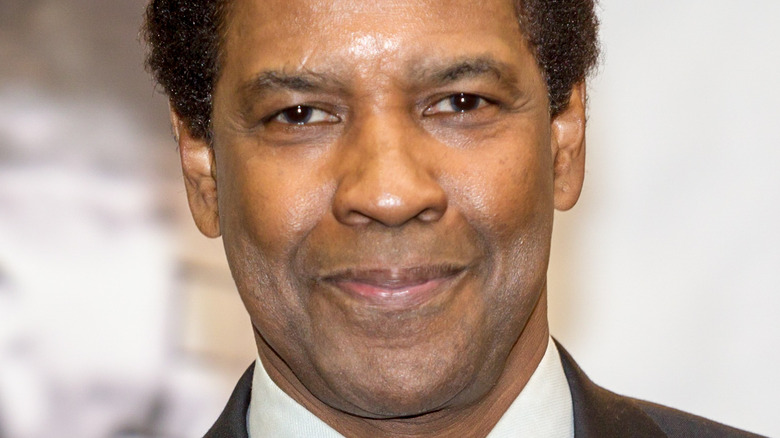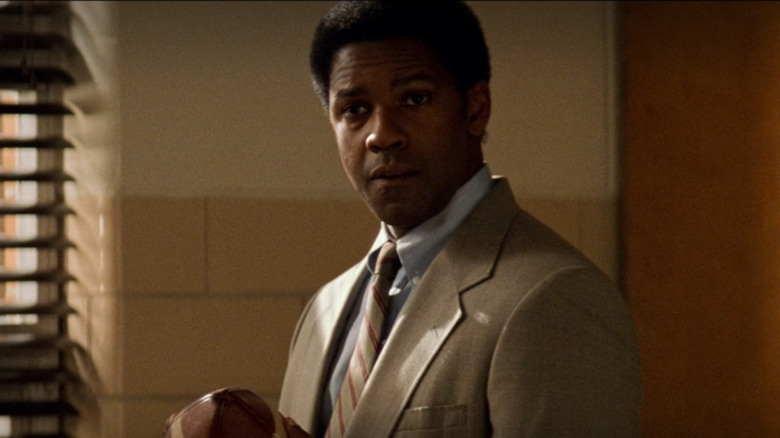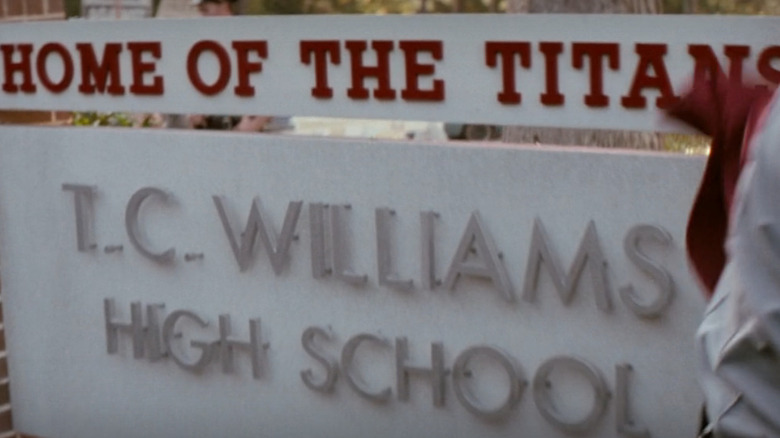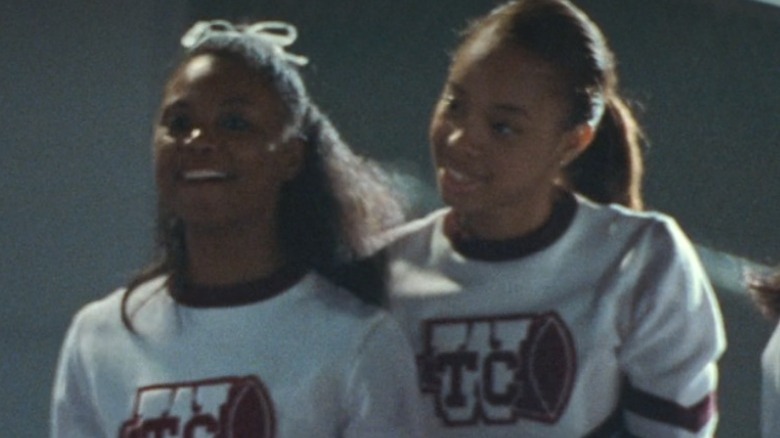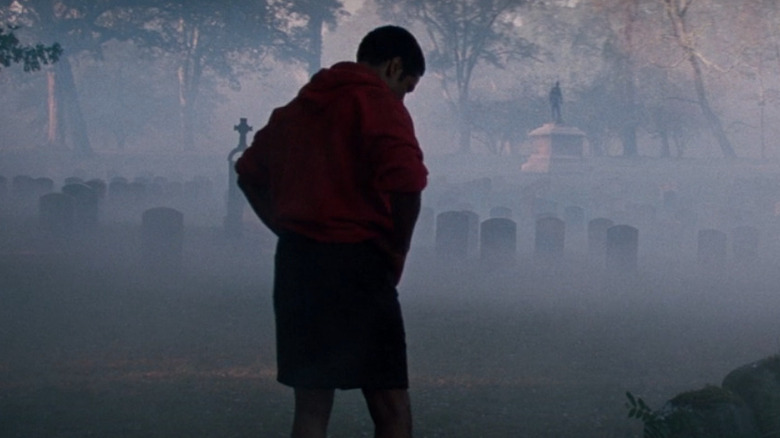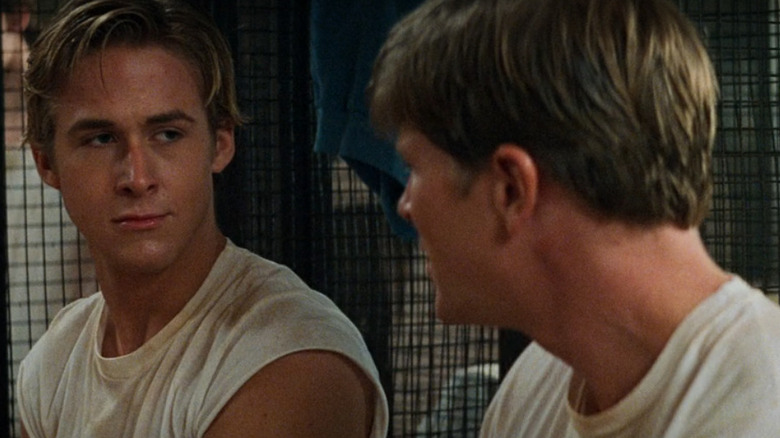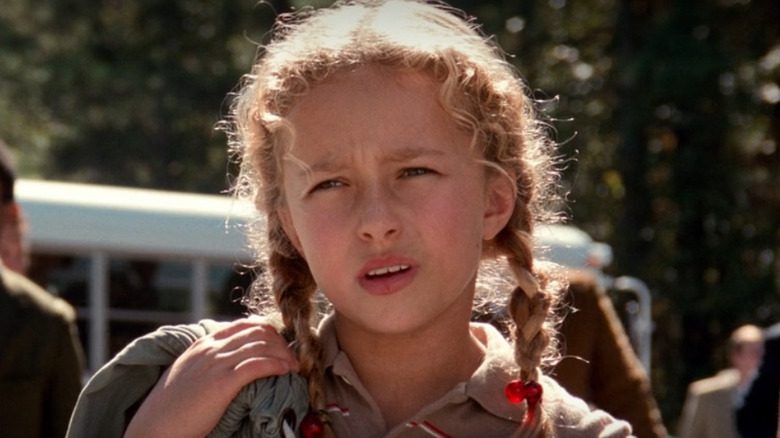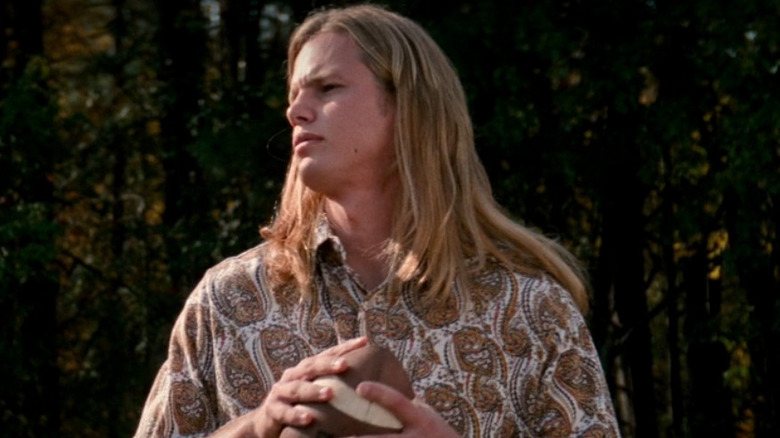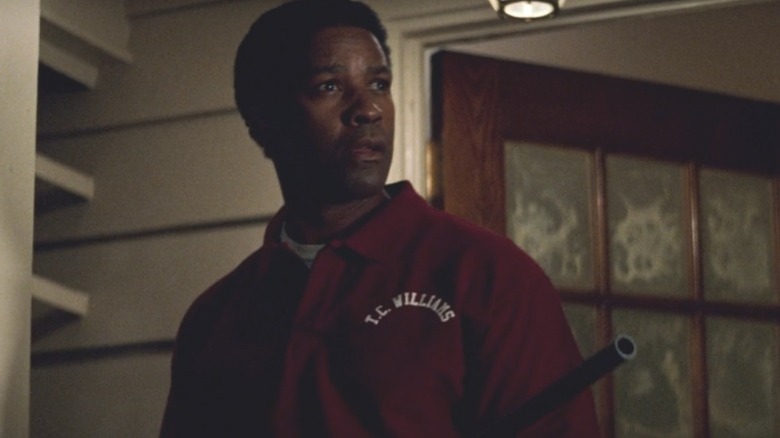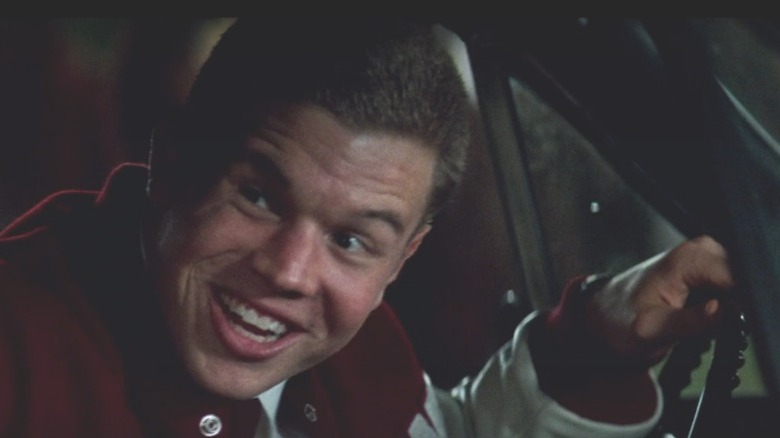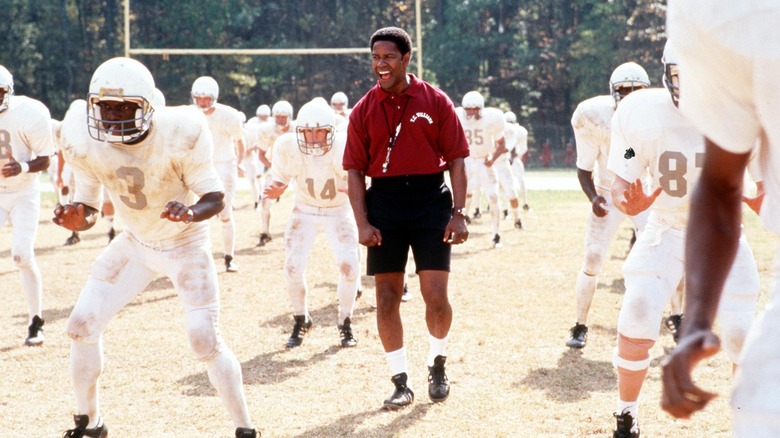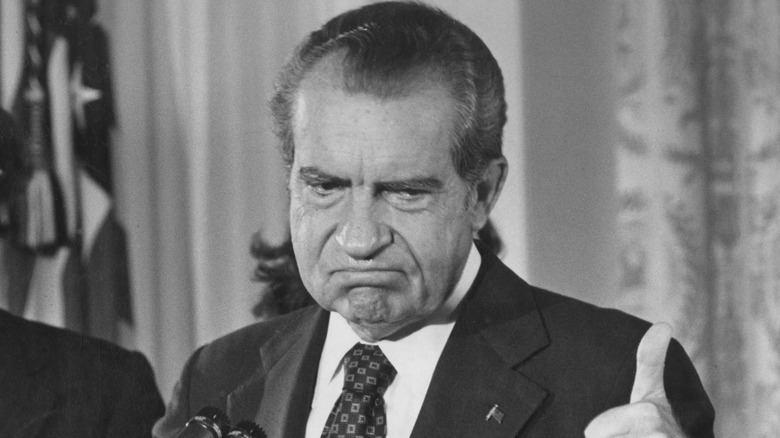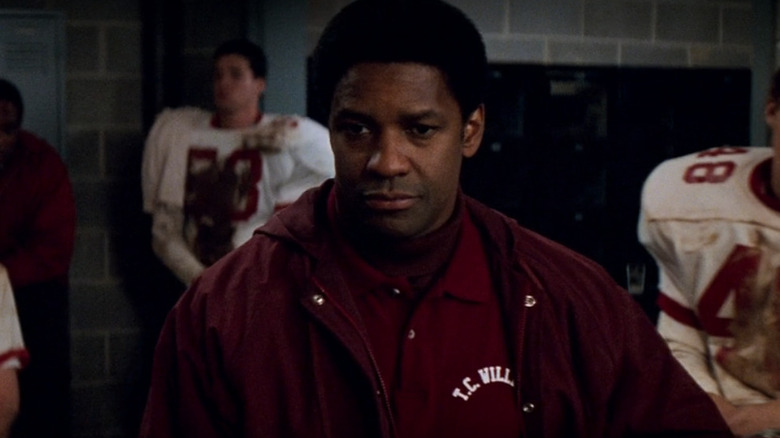Everything Remember The Titans Doesn't Tell You About The True Story
The 2000 Disney film "Remember the Titans" is best remembered as a heartfelt story about courage, brotherhood, and fighting racial bigotry in the name of football. It's also one of the highest grossing sports movies of all time. Directed by Boaz Yakin and written by Gregory Allen Howard, the film tells the true story of high school football coach Herman Boone and his team, the Titans, overcoming the racial tensions of the time and becoming a family along the way.
This civil rights sports movie gave us some great performances by a young ensemble cast, including Wood Harris, Ryan Hurst, Donald Faison, and Ryan Gosling. They proved their ability to hold their own alongside cinema veteran Denzel Washington, who plays Coach Herman Boone.
Like most movies inspired by a true story, some artistic liberties were taken in telling the onscreen version, although the real-life Coach Boone told The Observer-Reporter in 2002 that the movie is pretty accurate: "There are only about four or five things that were not true, but they weren't actually false either." Producer Jerry Bruckheimer stressed in an interview with the Washington Post that "Remember the Titans" was not meant to be a documentary, with screenwriter Howard adding, "You just have to maintain the spirit of the piece." For many reasons, certain facts and people didn't make it into the Disney version. Everything can't fit cohesively into a script while still telling a compelling tale, so here are parts of the true story that didn't make it into the film.
Coach Boone was in Virginia earlier
The film starts in July 1971, when racial tension seems to be at its height in the city of Alexandria, Virginia. A Black teenager is killed by a white store owner that summer, leading to protests in the streets. This is loosely based on a real-life incident where 19-year-old Robin Gibson was shot and killed by a white 7-Eleven employee, who suspected Gibson of stealing razor blades. The "Black high school" and the "white high school" are set to integrate, which adds to the conflict in the streets. Bill Yoast (Will Patton) is the football coach for Hammond High School. Directly after stopping his football players from joining in on a riot, he walks into his office to find new Assistant Coach Herman Boone (Denzel Washington.) The film depicts this as the first meeting of the two coaches, when in fact, it happened at least one year earlier.
The real-life Yoast recalled to ESPN, "Herman had been in the city for a year. We had met earlier, but on the football field." In the film, the school board decides that Boone will be the new Head Coach. This doesn't sit well with the team, Yoast's assistant Coach Tyrell, and especially Yoast's daughter Sheryl, because if Yoast isn't Head Coach then he's no longer eligible to be inducted into the Virginia High School Hall of Fame. In real life, such a thing didn't exist until 1972 (via ESPN), while Tyrell didn't exist at all.
T.C. Williams High School was already integrated
The film depicts 1971 as a time when the "all Black" high school and the "all white" high school joined together in order to create the newly integrated T.C. Williams High School. This creates conflict throughout the city and puts people's bigotry on display. As the schools and football teams merge, Coach Boone works hard to make sure this new way of life doesn't keep his players from putting their all in the game. On the way to training camp, he pairs them each with someone of the opposite race to sit with and room with while at camp. Boone then challenges them to learn new meaningful details about their roommates. He wants them to learn from each other. This seems to work when some of the boys actually find new friendships. Unfortunately, this brotherly love is met with a protest being held outside of the high school on the first day of school.
The real story of T.C. Williams High School starts in 1965 when it actually opened. It was the city's third high school and all three were already integrated. In 1971 the U.S. Supreme Court ruled unanimously for busing in Charlotte, North Carolina (via History.com). With other schools around the country looking to Charlotte as an example, the integration of schools began to happen quickly. Alexandria moved students around the district, putting all of the juniors and seniors in T.C. Williams.
The Titans cheerleaders had some obstacles too
Clearly, the football team is the main focus of "Remember the Titans." But it is rather surprising that we don't see anything onscreen about the Titans cheerleading squad, which also had some trouble bonding. Around the same time that the boys were off at training camp, the cheerleaders were learning to come together as well.
Marie Johnson Saadiqa-Turner was one of the four cheerleaders from George Washington High School chosen to take the bus to T.C. Williams. "I wasn't excited to go," Saadiqa-Turner told Northern Virginia Magazine. "GW was mainly a Black school. We weren't used to having the whites and Blacks together. When we came together, we were skeptical of who they were and what cheers they did." She recalled the GW girls as being more "soulful," while describing the girls from Francis Hammond High School as "rigid." They eventually learned each others' cheers and how to mix the styles to make it work, even managing to become friends. "By the second week of practice, we had come together. We became close," Saadiqa-Turner remembered.
Remember the Titans' Gettysburg speech
The Titans go to Gettysburg College for training camp. One morning Coach Boone wakes the team up at 3 a.m. to take a run through the woods. Dirty, wet, and tired, they arrive at the field where the Gettysburg battle took place. As the fog collects around the headstones, Coach gives an inspirational speech about the soldiers who lost their lives fighting the same battle against racism being fought presently. "Take a lesson from the dead. If we don't come together right now on this hallowed ground, we too will be destroyed," Boone tells his players. He calls for the boys to respect each other and learn to play the game like men.
As dramatic a moment this makes, it didn't really happen this way. The real-life team did tour the Gettysburg battlefield, but they had a tour guide and visited during a more reasonable time of day. Herman Boone remembered the tour guide as being very old, possibly in his 90s, and that he had been leading these tours for about 60 years (via ESPN.com) "He knew everything," Boone recalled. "As we stood there in that cemetery, (we) listened to him paint the picture of the thousands of young men who just fell dead."
Several characters weren't based on real people
The cast of "Remember the Titans" does a great job giving cinematic life to the real-life people who make up the story, which made such a mark on football history. But sometimes, in order to make a movie, some characters need to be added to create conflict or make it really spark. This Disney version of Coach Boone and his football team is no different.
Ryan Gosling plays Alan Bosley, a country music-loving boy who initially isn't really into the idea of integrating the high schools. But the cornerback quickly learns to respect and cherish his new teammates. It could be said that a scene where Alan gives up his spot to Pete (Donald Faison) during a game exists solely to emphasize the players' selflessness.
Another fictionalized character is tight end Ray Budds (Burgess Jenkins). Seeing as Ray is one of the more racist players on the team, his character — along with a problematic Coach Tyrell — was most likely created in order to add tension to the script. There were also a few characters, such as Gerry's girlfriend Emma (Kate Bosworth), who were a combination of several real-life people and their personalities.
Coach Yoast actually had four daughters
One of the most noteworthy performances in "Remember the Titans" is a very young Hayden Panettiere as Coach Yoast's very spirited and vocal daughter, Sheryl. In the film, it's just Sheryl and her dad, who she calls "Coach," with no real mention of her mother's whereabouts. Sheryl is presented as a football fanatic who knows just as much about the game as any of the adults around her. Also, she's not one to hold her tongue and will not be talked down to.
In addition to Sheryl, Bill Yoast had three other real-life daughters who were not portrayed in the film. All of his daughters lived with their mom. Bill Yoast told producer Jerry Bruckheimer, "I have four daughters. I don't like to look like I only have one daughter." Sadly, Sheryl passed away in 1996 before the film was made, but her sisters were okay with the film version of the Yoast family. In the DVD commentary, Yoast remembered Sheryl as "not quite the football fanatic they show here."
Sunshine wasn't the only one with long hair
While the Titans are at training camp, a young man arrives with his military father, looking for a football team to play on. Ronnie Bass (Kip Pardue), who the team nicknames "Sunshine," walks onto the field with his shoulder-length golden locks and proves immediately that he has what it takes to join the team. After seeing his impressive throw, Coach Yoast welcomes him to the team as long as he cuts his hair.
The real-life "Sunshine" did move to Virginia from California, but he insisted that he wasn't quite the hippie the onscreen version suggests. "I was never quite like that," Bass told the Greenville (SC) News. "But that's Hollywood. I'll say for the record my hair was never that long." But he did wear his hair long, as did most of the team because it was 1971 and that was the style (via ESPN.com).
A toilet was thrown through Boone's window
In an attempt to get the daughters of Coach Boone and Coach Yoast to bond, Sheryl comes over to the Boone house for a playdate. Not very interested in the dolls Nikki is playing with, Sheryl turns her attention to the game film that Coach Boone is watching. As little Sheryl is giving Coach Boone advice on his players, someone outside yells a racist slur and throws a brick through the window.
The real-life Boone family was a target of this hate crime, but it was something worse than a brick. In the DVD commentary, Coach Boone recalled, "It was something far more devastating ... I guess Disney, being the family movie production company that it is, felt that to depict a toilet stool coming through your window was a bit much."
The racism is the film wasn't nearly as devastating as the true-life events. Wood Harris, who played defensive end Julius Campbell, shared with The Washington Post that if "Remember the Titans" was made today, a studio other than Disney should handle it. "Race and racism are things that historically are serious," he said. "And we as a culture are too ignorant to present it in any kind of less than very realistic way."
Gerry Bertier did play in the State Championship
One of the most devastating moments in "Remember the Titans" is linebacker Gerry Bertier's car accident. The Titans have just won their way to the State Championship. Gerry cruises down the main street, waving as folks cheer him on. He becomes distracted and is broadsided by an oncoming truck. This results in Gerry being paralyzed and missing the chance to play in the State Championship game.
This event leads to a very heartfelt scene performed by Ryan Hurst, who plays Gerry, and Wood Harris, who plays Julius. Julius and Gerry have formed a strong friendship throughout the season, and Julius takes the news of his friend never walking again hard. Both actors have great respect for each other and what they each brought to that hospital scene. Hurst told GQ, "If you watch his performance, it's so nuanced, it's so brilliant, it's so eloquent. After those first couple lines, and you see this innocence and gentleness, it's master calligraphy brushstrokes. It's so beautiful."
Sadly, the real-life Bertier was paralyzed in a car accident, but it happened after the championship game, which he was able to play in. According to the Observer-Reporter, Bertier's accident happened as he was driving home from the team's banquet, where he was honored as the defensive MVP.
The Titans weren't really underdogs
One of the things that puts some extra pressure on the film version of Coach Boone is the threat of losing his job. While the team is away at training camp, the school board votes that if he loses one game, he'll find himself unemployed. Luckily, that threat is never carried out because the Titans start to win game after game.
It's never blatantly stated in "Remember the Titans," but it is implied that people aren't expecting much out of the 1971 Titans football team. In actuality, the team was undefeated, outscoring opponents 265–31. At the end of their season, the real-life Titans even ranked second in the nation (via Northern Virginia magazine). Charles Mitchell, a non-depicted player from the 1971 team, told ESPN.com, "There were more than a few times that I felt genuinely sorry for the teams we played." The challenge wasn't whether the boys were good players, but getting them to learn how to care about each other and play together.
The White House recognized Coach Boone's hard work
A common theme in sports films is the depiction of the home town coming together in the name of that team's success. In that respect, "Remember the Titans" is no different. At the beginning of the film, we see the city of Alexandria violently separated by race. By the end of the film, it seems the football fans are willing to look past their problems as they mingle in the stands.
In 1971, Richard Nixon was president of the United States and he, or at least someone on his staff, took notice of The Titans' success by way of an article written about them in the Washington Post. In November of that year, Coach Boone received a letter from Robert J. Brown, Special Assistant to the President, congratulating him on "the major contribution" he made in "bringing the citizens of Alexandria together."
Rufus Littlejohn, a linebacker on the 1971 Titans team, remembered the hoopla being confined to just the high school and neighborhood. "The day before game day, you'd wear your jersey around school and pump up some enthusiasm," Littlejohn told Northern Virginia magazine. "But as far as the rest of Alexandria, it was sort of ho-hum."
Coach Boone was eventually fired
At the end of a film inspired by true events, one can usually look forward to a "where are they now" montage to help answer the inevitable questions like, "What happened to Coach Boone after 1971?" "Remember the Titans" has a cute segment with footage of the cast, in which we learn about most of the major players in the story and what they've been up to since the movie's release in 2000.
Julius and Gerry stayed friends up until Gerry's death in a 1981 car accident caused by a drunk driver. The T.C. Williams gym was renamed after him. Petey Jones stayed in Alexandria and had a career in the Alexandria school system. Several other members of the football team also found themselves with successful careers in TV, real estate and business. Coach Boone guided the Titans for another five years, and later retired. The reason for his retirement — that he was fired from the school due to allegations of player abuse and coach complaints (via NBC Sports) — is not explained. In spite of that, he was awarded the Living Legend Award in 2016 — given to notable citizens of Alexandria, Virginia — three years before his death in 2019.
